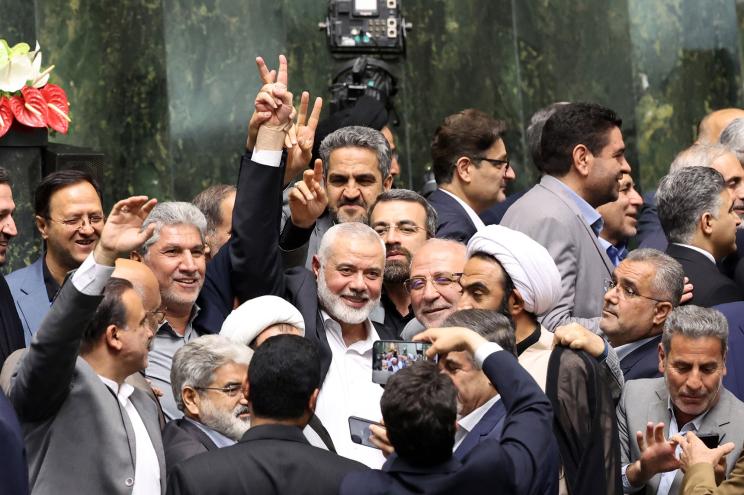The early Wednesday morning assassination in Tehran of Hamas’ Politburo head Ismail Haniyeh, attributed to Israel, reportedly caused a panic in the senior ranks of the Iranian regime.
Haniyeh, who was based in Doha, Qatar, was in Iran to attend the inauguration of Iran’s new president, Masoud Pezeshkia.
He was staying at a supposedly secret guesthouse operated by Iran’s Revolutionary Guard Corps at the time of his death.
Haniyeh’s assassination is rife with implications for the ongoing war between Israel and Hamas in Gaza and for the broader regional war that Iran is fighting against Israel directly and through its terror proxies.
At the time of his death, Haniyeh was responsible for the terror regime’s finances and arms flows.
He was also responsible for Hamas’s relations with its state sponsors, Qatar — where he resided since 2017 — as well Iran and Turkey.
Haniyeh also oversaw Hamas’ operations in the West, including its influence operations in the Western media.
Terrorist eulogizing
News stories from almost every major news agency and network in the US and Britain reporting his death referred to Haniyeh as a “moderate.”
These delusional characterizations attested to Haniyeh’s success in rebranding Hamas, a genocidal terror group, as a legitimate political entity.
His sudden departure from the scene will at least temporarily destabilize and subvert the financial networks and military supply lines he oversaw and perhaps undermine Hamas’ political warfare operations.
The fact that he was killed in Tehran has diplomatic implications.
It highlights the fact that Hamas is not an independent entity.
It is an Iranian proxy force, just like Hezbollah, the Houthis in Yemen, the Shiite militias in Syria and Iraq and the Palestinian Islamic Jihad, whose leader Ziad Nakhaleh was staying at the same IRGC guesthouse as Haniyeh.
This is important because it highlights the fact that the war in Gaza is not a stand-alone conflict.
It is a major battlefield in the regional war that Iran is leading against Israel through its proxies and directly.
The Biden administration, the EU, the UN and other major actors have obfuscated this state of affairs since Oct. 7.
Most of the media discourse regarding the consequences of Haniyeh’s assassination has revolved around its effect on the US-mediated hostage talks.
Most commentators argue that Haniyeh’s death will undermine the chance of reaching a deal.
But the opposite may well be the case.
To date, Haniyeh and his colleagues haven’t budged from their opening position that in exchange for the release of a small fraction of the 115 hostages still in Gaza, Israel agree to lose the war, removing its forces from Gaza and permitting Hamas to retain its political control of the terror mini-state and rebuild its forces.
Now that Haniyeh has been killed, Hamas’ surviving negotiators may opt for a more reasonable posture, to avoid a similar end.
The strategic implications of the operation in Tehran are arguably even more significant than its operational impact on Hamas, or the diplomatic fallout.
Assuming Israel is behind the hit, the operation demonstrated that the Jewish state has masterful intelligence and operational capabilities in Tehran.
The attack raises general awareness in Iran and across the region that the regime, hated by the vast majority of Iran’s citizenry, is weak and hollow.
It also showed that Israel is apparently capable of striking whatever and whoever it wishes, whenever it wishes to strike inside of Iran.
Iran on notice
Every Iranian official engaged in the war against Israel now knows he has a target on his forehead.
Israel’s decision not to claim responsibility for Haniyeh’s assassination adds to the tension and uncertainty.
With Israel’s operational and intelligence prowess inside Iran now clear, the regime must contend with the fact that its survival is on the line.
The regime aspires to regional hegemony.
But Israel is already a major regional power, and it is dead set on surviving and defeating Iran and its proxies in their war to destroy the Jewish state.
In light of what just happened, the regime may now realize that if it wishes to survive, its best bet may be to stand its terror armies down before it is too late.
Caroline Glick hosts the podcast “The Caroline Glick Show” and is a senior contributing editor at Jewish News Syndicate (JNS.org), She is a former adviser to Benjamin Netanyahu.
